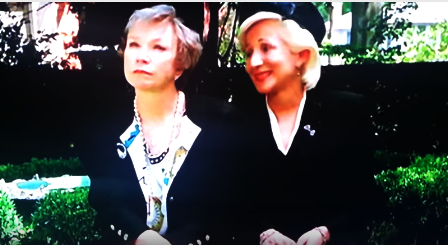
Remember that line in the 1989 movie, Steel Magnolias, where Clairee Belcher (Olympia Dukakis) says to Ouiser Boudreaux (Shirley MacLaine),”Ouiser, you know I love you more than my luggage.”?
Having lived in Louisiana, where the movie is set, I can imagine real women when I watch the movie and hear that line, and I think Clairee was really just saying, “Ouiser, you know I love you dearly, even more than I love my luggage and you know I love that luggage!” What makes the line so fabulous, is that it humorously illustrates how limited the English language is for conveying what we really mean when we say we love someone.
Think about it. Don’t many of us say we love pizza, and of course we all love our pets, but we also love our families and the people we choose to marry. Do we love them all the same – or if not, how would we know there’s a difference when we use the very same word to describe it all? Clairee at least tried to quantify her love for Ouiser by explaining that the kind of love she had for her was more than the kind she had for her luggage. Well, at least it’s a start…
Years ago, Latin and Ancient Greek were considered important to academic education in many countries like the US, and when talking about love, it’s very helpful to use the more descriptive Greek language to describe what we’re really trying to communicate.
For example, in the Greek, if I were to tell you I love pizza or I love my luggage, I’d actually be saying that I have a Phileo kind of love for those things. This type of love is the kind of love that is in line with our natural tastes and preferences. It’s easy love. i.e. If I love you because you and I share the same interests, we have a similar level of social graces and style, this is really a picture of a Phileo kind of love. It’s rich in emotion and feeling, like how I feel delighted when my children or pets do something wonderful, but it’s also very shallow so it’s the exact same type of love I feel when I get lots of ‘Likes’ on Facebook. There are rich emotions and feelings involved, they’re just really shallow, in the sense that if a person stops receiving whatever it is that causes the rich emotions and feelings – i.e. the ‘warm fuzzies’ start to fade – then we don’t have as much love for the person or thing.
A second type of love found in the Greek language, that isn’t captured by our English word, is a type of love called Storge. This is often the type of love you have when you say you love your family, your community, or your country. This is the kind of love that is duty oriented, and can even be unfeeling. An example of this type of love could be when you receive an invitation to attend a business function that you really do not want to attend but feel obligated to attend to help further your career. It could also be the kind of love where in a marriage the couple have irreconcilable differences and have stop even trying to reconcile, but stay married ‘for the kids’.
A third kind of love, called Agape, is more of a parental, mature or sacrificial kind of love. This is the kind of love that the Bible portrays that God has for mankind, where Jesus gave His life to reconcile man to God, even though some people reject it. It’s also the kind of love that parents generally have for their children, where they sacrifice of their own time, abilities, and resources, for the good of the child.
This kind of love demands nothing from the object of it’s love, and so when this type of love is being exercised, it is the kind of love that cannot fail. It’s for this reason that in years past, traditional wedding vows had the line, “for better and for worse, for richer and poorer, til death do we part”.
Lastly, there is romantic love, or Eros. This type of love is an idealistic type of love, and is usually between men and women, but can also be ‘platonic’ and extend to deep intimate friendships. It’s felt particularly within the body, and leads to children, joy, and laughter.
With all these kinds of love and just the one word in English to describe them, is there any wonder there are so many failed relationships where the people really thought they were ‘in love’?
The next time you say you love someone or something, or someone tells you they love you, try to understand more fully the kind of love that is really being talked about, and don’t be afraid to ask questions to gain a more complete understanding. It might feel odd at first to do so, but it could end up saving you (and that other person) a tremendous amount of time, energy – and even heartache – if one of you is talking more about luggage than the other is when it comes to talking about love.
Spot on. ( and i SOOO love this movie!)
‘Glad you enjoyed the post Sandra. Steel Magnolias will always be a classic in my book:)